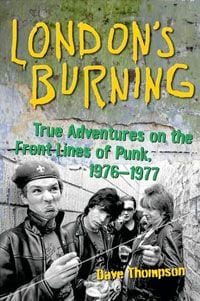
Dave Thompson’s introduction to London’s Burning starts with an odd premise that sets expectations low. He says that he was writing a “moir”; that is, a memoir “without too much ‘me’ in it.” He’s telling the story of an influential year in his life which coincided with the conception of punk rock in England, however, so it’s not just coincidence: the book is about the music.
The “me” however, is essential, as the book is primarily a story about the specifc experiences of the author during 1976-1977. His angle is that this is the year when punk when was really fresh, and only a select few, himself included, were on the scene when it was conceived. Everyone else jumped on the bandwagon when the year was over. Thompson attempts to extrapolate his identity from the book and puts himself forward as more of an eye witness.
As an eye witness he does well, in fact. Much of the book is written as though he is testifying before a jury rather than try to craft any piece of literature. For better or for worse, it’s a bit raw and rough around the edges. Lines such as “the Damned made a damned good record” fail to be funny and read like they’re plucked from a detective novel. Thompson has a robust career as a rock journalist, but this book is his journal, covering the shows he went to, the girl he met and moved in with, the jobs he had and the fights he found. It happens to be a personal journal that he fills with copious facts and anecdotes about the growth of punk.
Thompson is far better at describing musicians than he is at telling his own story. Those early lines are good indicators of what will come: when there is “me” in the “moir”, Thompson’s descriptions are simple, childish and at times they seem almost fabricated. But we can forgive him for this because of his disclaimer. We also forgive him because what shines through is a genuine appreciation and understanding of the music about which he writes.
Thompson’s experience, while not written to stand on its own, serves a tangible barometer for the social and cultural causes and effects of punk music in London. In particular, the economic backdrop is particularly useful in terms of understanding both the violence on the streets and the violence of the music. Thompson recounts the economic and day-to-day conditions in England in a way that sheds light on why the movement thrived, and what factored into the perceptions and decisions of an average concert-goer/record buyer.
He’s better at handling small details than dealing with epic moments in history, when he seems to be trying a bit too hard to be both descriptive and insert himself into the narrative. For example, his account of the Sex Pistols cursing on television is less compelling than his experience of selling a militant animals rights fanzine on a commission basis.
But some of his devices for personalizing the book seem cliched. Thompson puts “playlists” at the beginning of every chapter that simply represent what he was listening to at the time. Thompson’s own nostalgia is poorly conveyed and weighs down the book: some specific personal stories are too boyish, undeveloped and narrowly conceived.
But Thompson has made no claim that his own story is the one that should be primarily considered by his readers. When he does extract himself, he provides a unique perspective on the evolution of punk in its most formative year. And many of his experiences, specifically with racial tensions, truly do offer something valuable to the story of that first year in England. Not only can he provide a surplus of detailed facts, but as a primary source he enables the presence of underlying historical context which enriches and validates the book.
Thompson is an accomplished biographer, and his attention to detail and ability to insert relevant information serve him well as individual vignettes. However, his indecision about whether he is writing a memoir, biography or history result in what is ultimately a scrapbook. As a cohesive narrative, it fails to pull the reader from one chapter to the next. One can even lose sight of the fact that book only spans one year.
But the immediacy and originality of some of his stories win over to validate the “moi”. This is at the very least a book from which any serious fan of that period in music will draw some benefit.

![Call for Papers: All Things Reconsidered [MUSIC] May-August 2024](https://www.popmatters.com/wp-content/uploads/2024/04/all-things-reconsidered-call-music-may-2024-720x380.jpg)



